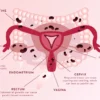Optimal nutrition is a fundamental component of reproductive health, playing a significant role in both natural conception and assisted reproductive technologies, such as IVF. Dietary intake influences hormone regulation, egg and sperm health, and the body’s ability to sustain a healthy pregnancy. A growing body of research demonstrates that targeted nutritional interventions can enhance reproductive outcomes. Whether preparing for natural conception or undergoing fertility treatments, optimising nutrition and addressing lifestyle factors represents an essential, evidence-based approach to supporting overall fertility and reproductive success.
Four key mechanisms for optimising fertility
1. Hormone Regulation
Underlying hormonal imbalances can directly impact our ability to conceive. PCOS, for example, is one of the leading causes of infertility. Nutrition plays an important role in managing PCOS and enhancing fertility by addressing underlying hormonal imbalances and metabolic dysfunction. A balanced diet rich in whole foods, healthy fats, fibre, and low glycaemic index carbohydrates helps improve insulin sensitivity which positively impacts ovarian function and fertility.
Hormonal imbalances can also occur due to a deficiency in micronutrients such as magnesium, zinc, vitamin D, and B vitamins. By improving nutritional status and correcting deficiencies we can improve ovarian function and menstrual regularity thereby improving chances of conception.
2. Egg and Sperm Quality
Egg and sperm cells are highly sensitive to oxidative stress and environmental toxins, which can damage their DNA and cell structure. Antioxidants such as vitamins C and E, zinc, selenium, CoQ10, and plant polyphenols help neutralise free radicals protecting egg and sperm cells from damage. Whilst diets high in sugar and highly processed foods and regular exposure to environmental toxins can worsen egg and sperm health.
By increasing antioxidant consumption and avoiding foods and toxins known to worsen oxidative stress we can enhance egg and sperm quality, reducing the risk of miscarriage and improving IVF success rates.
3. Uterine Environment and Implantation
The thickness and receptivity of the endometrial lining is essential for implantation and early foetal development. Omega-3 fatty acids found in oily fish such as salmon, mackerel, and sardines help reduce inflammation and enhance blood flow to the uterus. Nitric oxide, naturally present in beetroot further promotes nutrient-rich blood flow to the endometrium which if taken at the correct time can help promote implantation. Research also shows that diets rich in whole grains providing b-vitamins, fibre antioxidants and phytochemicals are positively associated with greater endometrial thickness and improved implantation rates.
4. Inflammation and the immune system
Chronic inflammation and immune dysfunction can become significant barriers to conception by negatively impacting the above key mechanisms – hormone regulation, egg and sperm quality and the uterine environment.
Further to this, the gut, vaginal and uterine microbiomes also play a critical role in regulating inflammation and impacting fertility outcomes. A diverse, plant-rich diet that includes fermented and probiotic foods promote a healthy gut microbiome which directly impacts the vaginal and uterine microbiomes. By cultivating a healthy gut microbiome, we can reduce local and systemic inflammation, which can significantly enhance reproductive function and increase IVF success.
In vitro fertilisation (IVF)
Personalised nutrition becomes particularly important during IVF due to:
- Higher physical demands: IVF places significant stress on the body tailored nutrition helps support those demands
- Individual variability: Each person has unique nutrient needs, genetic variations, gut health status, and metabolic profiles that can affect how they respond to fertility treatments.
- Minimising risk: IVF often involves multiple cycles, personalised nutrition supports recovery and increases the success rate of an IVF cycle, which we know is very taxing both emotionally and financially.
Whether conception occurs naturally or with the support of assisted reproductive technologies, personalised nutrition plays an indispensable role in improving fertility outcomes and supporting a healthy pregnancy. It establishes the foundations for successful reproduction while also contributing to the long-term health of both mother and child.
Dr Rami Wakim



